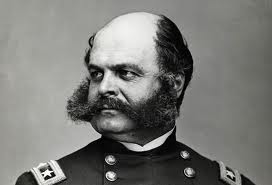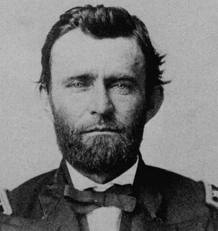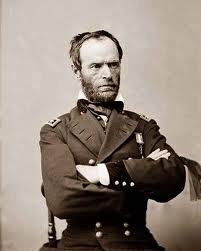 Knoxville, was facing doom as far as General Ambrose Burnside was concerned, until General W.T. Sherman rescued East Tennessee. Burnside believed that Knoxville’s citizens were cheering his arrival, however the ovation was in appreciation for the returning Eastern Tennessee troopers that had fled to Kentucky in order to enlist in the Union Army. General Burnside incessantly wired Washington that his army was starving and short of supplies during his occupation of Knoxville, Tennessee, in late November of 1863. The paranoid General constantly complained, to the Secretary of War, that Confederate General Longstreet’s superior forces would overrun his defenses, equating a devastating reversal of control in Eastern Tennessee. In fact, Burnside’s forces greatly outnumbered Longstreet’s and the defenses of Knoxville were formidable. One of President Lincoln’s main concerns, since the beginning of the Civil War, were the Union loyal residents of Eastern Tennessee. The President would not allow any Union shortcomings in the battle for Tennessee and personally reminded General U.S. Grant, nearly every day, of the importance of Knoxville and Burnside’s precarious situation.
Knoxville, was facing doom as far as General Ambrose Burnside was concerned, until General W.T. Sherman rescued East Tennessee. Burnside believed that Knoxville’s citizens were cheering his arrival, however the ovation was in appreciation for the returning Eastern Tennessee troopers that had fled to Kentucky in order to enlist in the Union Army. General Burnside incessantly wired Washington that his army was starving and short of supplies during his occupation of Knoxville, Tennessee, in late November of 1863. The paranoid General constantly complained, to the Secretary of War, that Confederate General Longstreet’s superior forces would overrun his defenses, equating a devastating reversal of control in Eastern Tennessee. In fact, Burnside’s forces greatly outnumbered Longstreet’s and the defenses of Knoxville were formidable. One of President Lincoln’s main concerns, since the beginning of the Civil War, were the Union loyal residents of Eastern Tennessee. The President would not allow any Union shortcomings in the battle for Tennessee and personally reminded General U.S. Grant, nearly every day, of the importance of Knoxville and Burnside’s precarious situation.
 General Grant knew that Sherman, his most reliable General, was the only leader to trust with the relief of Knoxville and its incompetent General. Sherman played too important a role in Grant’s plans for the defeat of Bragg, at Chattanooga, to send him to the immediate rescue of East Tennessee, Burnside and Knoxville would just have to wait, until the job at hand was complete.
General Grant knew that Sherman, his most reliable General, was the only leader to trust with the relief of Knoxville and its incompetent General. Sherman played too important a role in Grant’s plans for the defeat of Bragg, at Chattanooga, to send him to the immediate rescue of East Tennessee, Burnside and Knoxville would just have to wait, until the job at hand was complete.
General Ambrose Burnside, a West Point graduate and Mexican War veteran, tenure during the Civil War was marred by several glaring failures in command. In has been said, that his pre-war invention of the Burnside Carbine and employment with the Illinois Central Railroad, by George B. McClellan, led to a succession of postings that resulted in a less than stellar performance. Two of Burnside’s most infamous and bloody defeats occurred at the Battle of Fredericksburg and the Battle of the Crater, after which he was relieved from further duty.
 On November 25, 1863, Confederate General Braxton Bragg abandoned the heights above Chattanooga and retreated to Dalton, Georgia. This allowed Grant, a respite from Burnside’s whining in Knoxville and ordered an immediate forced march by General Sherman’s fatigued, cold and hungry army to break the siege. Sherman’s Union troopers marched day and night, over 100 miles, through freezing rain and snow, with little or no hot food or rest. General Sherman had been told, over and over, how desperate and precarious Burnside’s situation was and drove his army with that in mind. Finally, with his exhausted forces nearing the beleaguered city, Sherman and his staff galloped into Knoxville.
On November 25, 1863, Confederate General Braxton Bragg abandoned the heights above Chattanooga and retreated to Dalton, Georgia. This allowed Grant, a respite from Burnside’s whining in Knoxville and ordered an immediate forced march by General Sherman’s fatigued, cold and hungry army to break the siege. Sherman’s Union troopers marched day and night, over 100 miles, through freezing rain and snow, with little or no hot food or rest. General Sherman had been told, over and over, how desperate and precarious Burnside’s situation was and drove his army with that in mind. Finally, with his exhausted forces nearing the beleaguered city, Sherman and his staff galloped into Knoxville.
One of the first things that Sherman noticed, was a large corral of prime beef cattle on the edge of town. The General was greeted by Burnside’s staff and ushered into the command’s headquarters, where he was invited to dine. All of the officers at the table were immaculately uniformed, the fine white linen table-cloth, exquisite silver settings, crystals of wine, roasts of beef and boiled potatoes, Sherman wondered who was rescuing whom?
After the feast General Sherman returned to his army’s encampment and remarked to an aide,
If I knew how bad off General Burnside was, we would have got here a little sooner.
Bummer


I loved this story and shared it with my Civil War favorites. Chattanooga was starving to death, while Burnside bitched and moaned to Washington. Over 10,000 horses starved and our soldiers rations were cut to nil. Nil translates to a saltine or two plus a piece of sausage for infantry. Later, soldiers complained of rations of vinegar, pepper and a candle. Such was life 130 miles south of Burnside’s command.
Sandy,
Burnside has always given Bummer a major case of heartburn. A political appointee, that always cried wolf. Inept at least, some say a war criminal for the losses that his command’s suffered. If it had been up to Grant and Sherman, they would have let him wither and die someplace or horsewhipped. Guess you can tell Bummer isn’t a fan of Burnside.
Thanks for the read, a new post daily, please stop again and appreciate the comment.
Bummer
No matter how much I read about the Civil War I never cease to wonder how the Union survived such a string of disastrous generals until Grant, Sherman and Sheridan got everything under control. Never discount the supply chain and the advantage in manufacturing the North had.
Louis,
Burnside was a nightmare from the beginning. Politically connected, he and McClellan were connected at the wrist and ankles. I don’t think Grant could ever tolerate him. The supply chain and manufacturing in the North, could never be overcome, the Confederacy could never have won the bloodbath.
Bummer
Our friends at The Civil War Monitor have their latest issue out. For
the next week, Disunion fans can read the digital edition of the
magazine for free.
Simply visit the link below and sign in with this username and password (all lowercase):
username: disunion
password: cwm2412